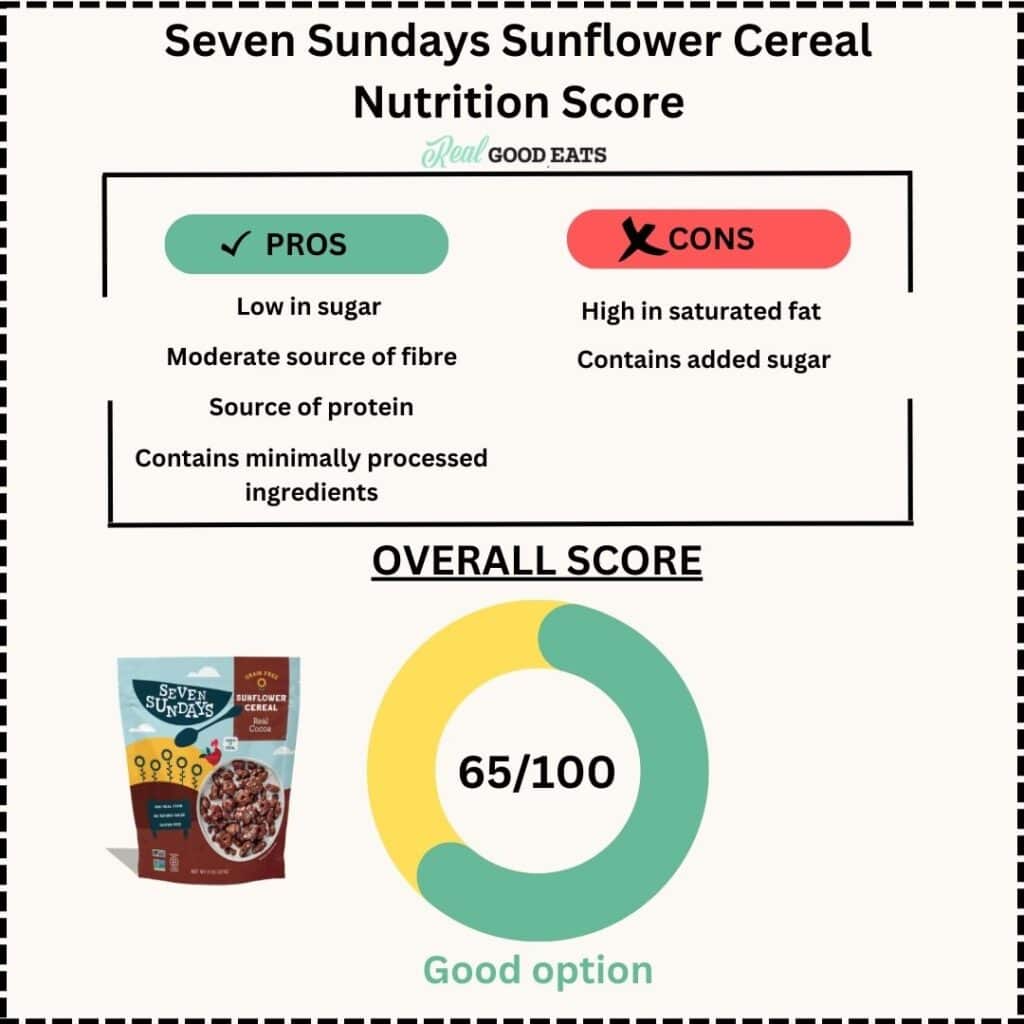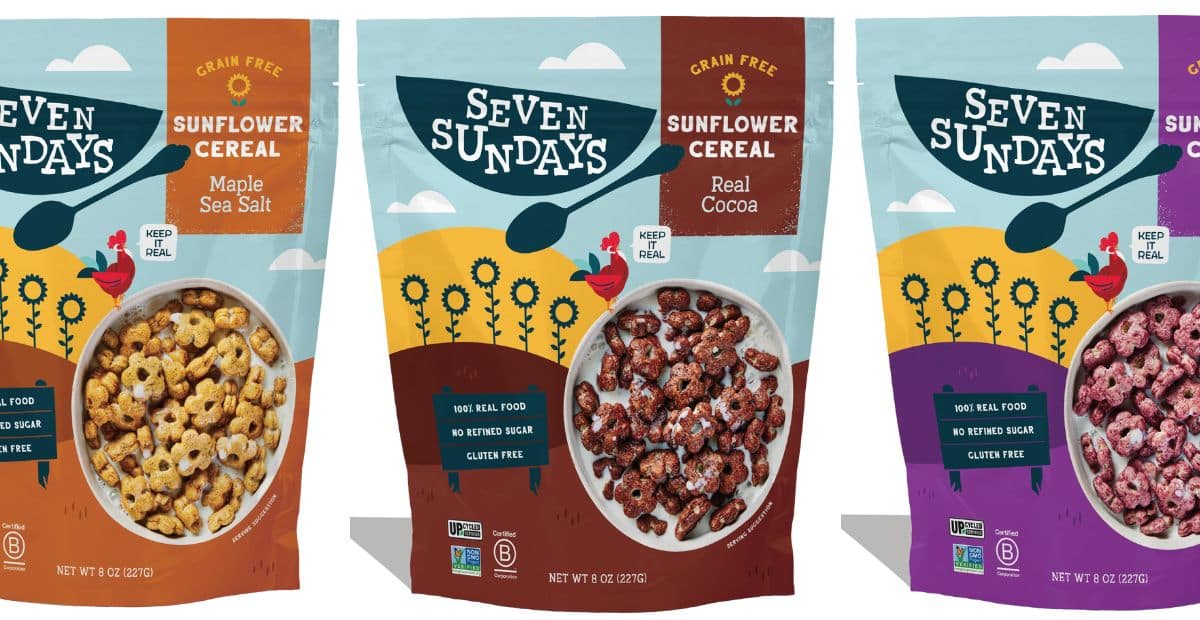Is Seven Sundays Sunflower Cereal healthy? With so many cereals claiming to be “better for you,” it can be hard to tell which ones actually deliver. If you’ve seen this cereal on store shelves or social media, you’ve probably noticed its packaging and claims like “grain-free” and “made with real food.” But how does it stack up nutritionally? As a dietitian, I’m breaking down the ingredients, nutrition facts, and overall pros and cons to help you decide if Seven Sundays Sunflower Cereal is worth adding to your cart.
About Seven Sundays Sunflower Cereal
Seven Sundays Sunflower cereal is a line of grain-free cereal. They are marketed as being “100% real food” and containing “no refined sugar”. It is available in three flavours: Real Cocoa, Real Berry, and Maple Sea Salt.
Is Seven Sundays Sunflower Cereal Healthy? Ingredients
| Ingredients | |
|---|---|
| Real Cocoa | Cassava, Sunflower Protein, Dates, Cocoa Powder, Coconut Sugar, Coconut Oil, Vanilla Extract, Sea Salt. |
| Real Berry | Cassava, Sunflower Protein, Maple Syrup, Coconut Oil, Strawberries, Blueberries, Vanilla Extract, Lemon Extract. |
| Maple Sea Salt | Cassava, Sunflower Protein, Maple Syrup, Coconut Oil, Dates, Maple Sugar, Vanilla Extract, Sea Salt. |
The ingredients below are from Seven Sunday Sunflower Real Cocoa flavour. See the chart above for the ingredients in all flavours.
Cassava flour: flour from the starchy root vegetable Yuca. This flour is a source of resistant starch, which acts like a fibre and a gut-healthy prebiotic.
Sunflower protein: protein powder made from sunflower seeds.
Dates: a low glycemic source of natural sugar. This is the primary sugar source in this cereal.
Coconut oil: oil coming from the meat of the coconut, containing mostly saturated fats.
Cocoa powder: unsweetened form of chocolate. This is the leftover part of the cocoa bean after the cocoa butter has been removed.
Coconut sugar: coconut sugar tends to be lower glycemic index (GI) compared to table sugar, but it depends on the source used. The GI of coconut sugar has been reported anywhere from 34 to 54. In comparison, table sugar has a glycemic index of 59. In any case, there is only about 1 g of coconut sugar per 1 cup of cereal.
Vanilla extract: added for flavour.
Sea salt: a source of sodium added for flavour.
Seven Sundays Sunflower Cereal Nutrition Facts
| Per 1 cup (40 g) | Real Cocoa | Real Berry | Maple Sea Salt |
|---|---|---|---|
| Calories | 170 | 170 | 170 |
| Fat (g) | 6 | 5 | 6 |
| Saturated fat (g) | 4 | 3.5 | 4 |
| Sodium (mg) | 30 | 5 | 40 |
| Total carbohydrates (g) | 27 | 28 | 28 |
| Fibre (g) | 3 | 2 | 2 |
| Sugar (g) | 5 | 6 | 7 |
| Added sugar (g) | 1 | 5 | 5 |
| Protein (g) | 5 | 5 | 5 |
| Vitamin D (mcg) | 0 | 0 | 0 |
| Calcium (mg) | 20 | 30 | 20 |
| Iron (mg) | 1 | 0.8 | 0.8 |
| Potassium (mg) | 100 | 40 | 50 |
The nutrition facts below are for the Real Cocoa flavour (per 1 cup serving). See the table above for the nutrition facts from all flavours.
Calories: 170
Fat: 6 g primarily from coconut oil (about 1 tsp per serving) with trace amounts from cocoa powder.
Saturated fat: 4 g from coconut oil.
Sodium: 30 mg from sea salt.
Carbohydrates: 27 g from cassava flour, dates, and coconut sugar.
Fibre: 3 g from cassava flour and dates.
Sugar: 5 g from dates (primarily) and coconut sugar, which contributes about 1 g.
Protein: 5 g from sunflower protein.
Other nutrients: 20 mg calcium, 1 mg iron, 100 mg potassium.
Is Seven Sundays Sunflower Cereal Healthy? Dietitian Review
Seven Sundays Sunflower Cereal has a nutrition score of 65 out of 100. On the plus side, it has a simple ingredient list (which is in line with the “100% real food” claim). The primary source of carbohydrates is cassava, which contains resistant starch (which acts like a fibre), while dates serve as the main sweetener. Dates are naturally sweet yet low on the glycemic index. Overall, it’s a well-rounded cereal with a nice balance of protein, fats, and carbs and is low in sugar. This cereal stands out compared to other grain-free cereals on the market as it contains a decent amount of fibre, despite being grain-free, and is low in sugar without the use of non-sugar sweeteners. Both of these attributes are rare in the grain-free cereal category.
That said, if you’re just looking for a generally healthy cereal (not specifically grain-free), this one doesn’t stand out all that much (aside from the price tag $$$). I typically recommend at least 4 g of fibre in a cereal, and this one falls just short. However, 3 g is actually pretty good when you compare it to most gluten-free cereals, which often have very little fibre. When it comes to protein, many whole-grain cereals naturally provide 4–6 g per serving without added protein powder, so the protein here isn’t exactly a standout. And many of those cereals also have relatively simple ingredient lists without much in the way of additives, so that’s not a unique selling point either.

Other posts you might like:
- Magic Spoon Cereal Dietitian Review
- Cereal Nutrition Facts Comparison (2025)
- 22 High Protein Cereal Options to Fuel Your Morning
Sources:
- Glycemic Index Search, The University of Sydney
- Trinidad, Trinidad P., et al. “Glycemic index of commonly consumed carbohydrate foods in the Philippines.” Journal of functional foods 2.4 (2010): 271-274.
APA


